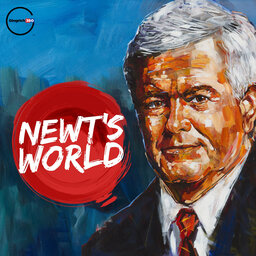Episode 742: The Conservative Environmentalist
Many have led us to believe that there are only two approaches to climate change: doomerism or denial. In his new book, “The Conservative Environmentalist: Common Sense Solutions for a Sustainable Future,” Benji Backer offers a fresh approach needed to ensure a sustainable future, and particularly one that works for America. Newt’s guest is Benji Backer. He is the President and Founder of the American Conservation Coalition, the largest right-of-center environmental organization in the country.
In 1 playlist(s)
Newt's World
Join former House Speaker, professor, historian, and futurist Newt Gingrich as he shares his lifetim…Social links
Follow podcast
Recent clips

Episode 948: ‘Moneyball’ for Politics
30:34

Episode 947: Will AI Take My Job
28:22

Episode 946: Peter Schweizer on “The Invisible Coup”
34:50
 Newt's World
Newt's World